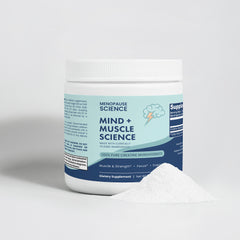Trust Center Verified
Comprehensive analysis of clinical research and evidence*

Mind & Muscle Science By Menopause Science
Our pharmaceutical-grade creatine monohydrate is produced by a global leader in creatine research and manufacturing. This is the same form of creatine used in the majority of clinical studies, including the postmenopausal women trials cited below. Each batch undergoes rigorous third-party testing for purity, potency, and safety to ensure you receive the research-backed benefits.*
Research Summary
Creatine monohydrate is the most clinically studied supplement in the world. It has been tested in hundreds of randomized controlled trials over the past 30 years. It’s effective, affordable, and among the safest supplements available when used at recommended doses.
Creatine monohydrate works by increasing phosphocreatine stores in muscle tissue, providing rapid energy for cellular processes, including muscle contraction and protein synthesis. During menopause and perimenopause, declining estrogen accelerates muscle loss (sarcopenia), reduces bone density, and can impact cognitive function. Clinical studies in postmenopausal women demonstrate that creatine supplementation, particularly when combined with resistance training, may help support muscle preservation, bone health, and cognitive performance, addressing three critical areas affected by hormonal changes during midlife.*
Research at a Glance
| Ingredient | Population Studied | Studied Benefit(s) | Research Link |
|---|---|---|---|
| Creatine Monohydrate | Postmenopausal women with resistance training. 12 months, randomized controlled trial. | May help preserve femoral neck bone mineral density and support bone strength indicators | View Study |
| Creatine Monohydrate | Postmenopausal women with exercise. 2 years, randomized controlled trial | May support bone geometric properties at hip, particularly with higher doses | View Study |
| Creatine Monohydrate | Older women (ages 55-71). 2 years, randomized controlled trial | 3g daily may support bone health maintenance in aging women | View Study |
| Creatine Monohydrate | Women with fibromyalgia. 16 weeks, randomized controlled trial. | May support muscle function and intramuscular energy stores | View Study |
| Creatine Monohydrate | Adults during sleep deprivation. Single dose study | May support cognitive performance and brain energy metabolism during stress | View Study |
Plain Language Summary
Research shows that creatine monohydrate is one of the most studied and safest supplements available, with particular relevance for women during and after menopause. Clinical trials suggest that creatine, especially when combined with resistance training, may help support lean muscle, promote markers of bone strength, and assist with aspects of cognitive performance. Studies lasting one to two years have reported positive effects on indicators of bone health, while shorter trials suggest creatine may help support muscle energy and function. Additional research indicates it may also help the brain’s natural energy processes during times of stress or sleep disruption—common experiences during midlife. Taken consistently at 3–5 grams per day, creatine has a strong safety record over decades of use, with minimal side effects in healthy individuals, making it a well-researched option for supporting strength, bone health, and mental clarity during menopause.*
Key Citations
Primary Research in Menopausal Women:
- Effects of creatine and resistance training on bone health in postmenopausal women. Med Sci Sports Exerc. 2015;47(7):1398-407. PubMed: 25386713
- A 2-yr randomized controlled trial on creatine supplementation during exercise for postmenopausal bone health. Med Sci Sports Exerc. 2023;55(10):1789-1797. PubMed: 37144634
Supporting Research in Women:
- Creatine supplementation and bone health in older women: a 2-year, randomized, placebo-controlled trial. J Gerontol A Biol Sci Med Sci. 2020;75(5):931-938. PubMed: 31257405
- Creatine supplementation in fibromyalgia: a randomized, double-blind, placebo-controlled trial. Arthritis Care Res. 2013;65(9):1449-59. PubMed: 23554283
Additional Research:
- Effect of creatine supplementation and sleep deprivation, with mild exercise, on cognitive and psychomotor performance, mood state, and plasma concentrations of catecholamines and cortisol. Psychopharmacology. 2006;185(1):93-103. PubMed: 16416332
- Single dose creatine improves cognitive performance and induces changes in cerebral high energy phosphates during sleep deprivation. Sci Rep. 2024;14(1):4095. PubMed: 38418482
Less Fog, More Flex
Support your brain and biceps with research-backed creatine monohydrate from Menopause Science.
Shop NowThese statements have not been evaluated by the Food and Drug Administration. This product is not intended to diagnose, treat, cure, or prevent any disease. Always consult with your healthcare provider before starting any new supplement regimen, especially if you have pre-existing health conditions or are taking medications.
The research cited represents studies conducted on individual ingredients and may not reflect the specific formulation of this product. Individual results may vary based on sleep hygiene, stress levels, health status, and other factors. The research cited represents potential benefits and does not guarantee specific outcomes for all users.
